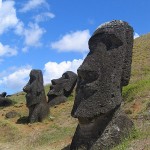April 5 is:
Caramel Day As early as the seventeenth century, American women were using caramelized sugar and water to make candies. It was a rather economical candy to produce. Around the year 1850, someone discovered that by adding milk and a fat product to the cooked sugar mixture that a soft, chewy candy would be produced. This candy very quickly became popular.
In Virginia, Native American Pocahontas married English colonist John Rolfe on April 5, 1614.
Pocahontas was the daughter of Powhatan, the leader of an alliance of Algonquian-speaking people living in the Tidewater region of Virginia at the time English settlers landed at Jamestown in 1607. She was captured and held for ransom by the Colonists during hostilities in 1613. During her captivity, she was encouraged to convert to Christianity and was baptized under the name Rebecca. She married tobacco planter John Rolfe in April 1614 at age 17, and she bore their son Thomas Rolfe in January 1615. In 1616, the Rolfes traveled to London where Pocahontas was presented to English society as an example of the “civilized savage” in hopes of stimulating investment in the Jamestown settlement. She became something of a celebrity, was elegantly feted, and attended a masque at Whitehall Palace. In 1617, the Rolfes set sail for Virginia, but Pocahontas died at Gravesend in Kent, England, of unknown causes, aged 20 or 21.
On this day in 1621, the Mayflower set sail from Plymouth, Massachusetts on a return trip to England. The Mayflower made excellent time on her voyage back to England. The westerly winds that had buffeted her coming out pushed her along going home, and she arrived at the home port of Rotherhithe in London on May 6, 1621, less than half the time that it had taken her to sail to America.
 April 5, 1722 – Jacob Roggeveen became the first European to land on Easter Island, landing there on Easter Sunday.
April 5, 1722 – Jacob Roggeveen became the first European to land on Easter Island, landing there on Easter Sunday.
In 1792, U.S. President George Washington exercised his authority to veto a bill, the first time this power was used in the United States. The bill introduced a new plan for dividing seats in the House of Representatives that would have increased the amount of seats for northern states. Jefferson convinced Washington that the bill was unconstitutional. Washington exercised his veto power only one other time during his two terms in office. He vetoed an act that would have reduced the number of Cavalry units in the army.
Birthday of Joseph Lister (April 5, 1827), English physician, founder of aseptic surgery.
April 5, 1933 – U.S. President Franklin D. Roosevelt signed two executive orders: 6101 to establish the Civilian Conservation Corps, and 6102 “forbidding the Hoarding of Gold Coin, Gold Bullion, and Gold Certificates” by U.S. citizens.
1936 Tupelo, Mississippi virtually annihilated by a tornado, 216 Tupelo residents died. According to Wikipedia: The 1936 Tupelo–Gainesville tornado outbreak was an outbreak of at least 12 tornadoes that struck the Southeastern United States from April 5–6, 1936. Approximately 454 people were killed by these tornadoes—419 by two tornadoes alone. This outbreak is the second deadliest ever recorded in US history. Notably, among the survivors were one-year-old Elvis Presley and his parents.
1972 The regular MLB season fails to open due to a player strike for the first time in history; 86 games were lost before the labor dispute settled.
